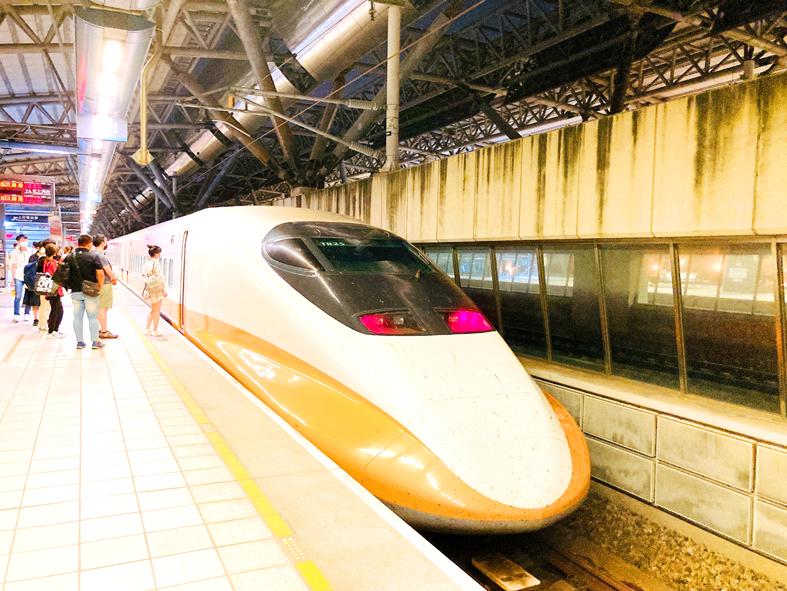Taiwan High Speed Rail Corp (THSRC) yesterday became the nation’s first public transport service provider to issue sustainability bonds to fund its green initiatives and social investment projects.
Sustainability bonds refer to financing instruments in which the issuer uses all the funds raised for green initiatives, social investment projects or other related plans. The bonds must be issued based on the Taipei Exchange’s “Rules Governing the Issuance of Sustainability Bonds,” and can be traded on the over-the-counter market.
“The issuance of the sustainability bonds shows our determination to fulfill our responsibilities to the environment, society and corporate governance, as well as our commitment to pursuing the sustainable development of the rail service,” it said in a statement.

Photo: Chen Hsin-yu, Taipei Times
The NT$1 billion (US$35.95 million) sustainable bond issue has a maturity of three years and a fixed annual interest rate of 0.3 percent.
The funds raised through the issuance of the bonds would be used to accelerate the automation of its Yenchao (燕巢) maintenance depot and update the passenger information system at high-speed rail stations, the company said.
The Yenchao project is a green investment plan, as it would prevent and control pollution. Meanwhile, the passenger information system update is a social investment that would integrate the internal broadcast system to provide riders with real-time train schedules, weather forecasts and information on major events and emergencies, it added.

Taiwan has received more than US$70 million in royalties as of the end of last year from developing the F-16V jet as countries worldwide purchase or upgrade to this popular model, government and military officials said on Saturday. Taiwan funded the development of the F-16V jet and ended up the sole investor as other countries withdrew from the program. Now the F-16V is increasingly popular and countries must pay Taiwan a percentage in royalties when they purchase new F-16V aircraft or upgrade older F-16 models. The next five years are expected to be the peak for these royalties, with Taiwan potentially earning

STAY IN YOUR LANE: As the US and Israel attack Iran, the ministry has warned China not to overstep by including Taiwanese citizens in its evacuation orders The Ministry of Foreign Affairs (MOFA) yesterday rebuked a statement by China’s embassy in Israel that it would evacuate Taiwanese holders of Chinese travel documents from Israel amid the latter’s escalating conflict with Iran. Tensions have risen across the Middle East in the wake of US and Israeli airstrikes on Iran beginning Saturday. China subsequently issued an evacuation notice for its citizens. In a news release, the Chinese embassy in Israel said holders of “Taiwan compatriot permits (台胞證)” issued to Taiwanese nationals by Chinese authorities for travel to China — could register for evacuation to Egypt. In Taipei, the ministry yesterday said Taiwan

Taiwan is awaiting official notification from the US regarding the status of the Agreement on Reciprocal Trade (ART) after the US Supreme Court ruled US President Donald Trump's global tariffs unconstitutional. Speaking to reporters before a legislative hearing today, Premier Cho Jung-tai (卓榮泰) said that Taiwan's negotiation team remains focused on ensuring that the bilateral trade deal remains intact despite the legal challenge to Trump's tariff policy. "The US has pledged to notify its trade partners once the subsequent administrative and legal processes are finalized, and that certainly includes Taiwan," Cho said when asked about opposition parties’ doubts that the ART was

If China chose to invade Taiwan tomorrow, it would only have to sever three undersea fiber-optic cable clusters to cause a data blackout, Jason Hsu (許毓仁), a senior fellow at the Hudson Institute and former Chinese Nationalist Party (KMT) legislator, told a US security panel yesterday. In a Taiwan contingency, cable disruption would be one of the earliest preinvasion actions and the signal that escalation had begun, he said, adding that Taiwan’s current cable repair capabilities are insufficient. The US-China Economic and Security Review Commission (USCC) yesterday held a hearing on US-China Competition Under the Sea, with Hsu speaking on